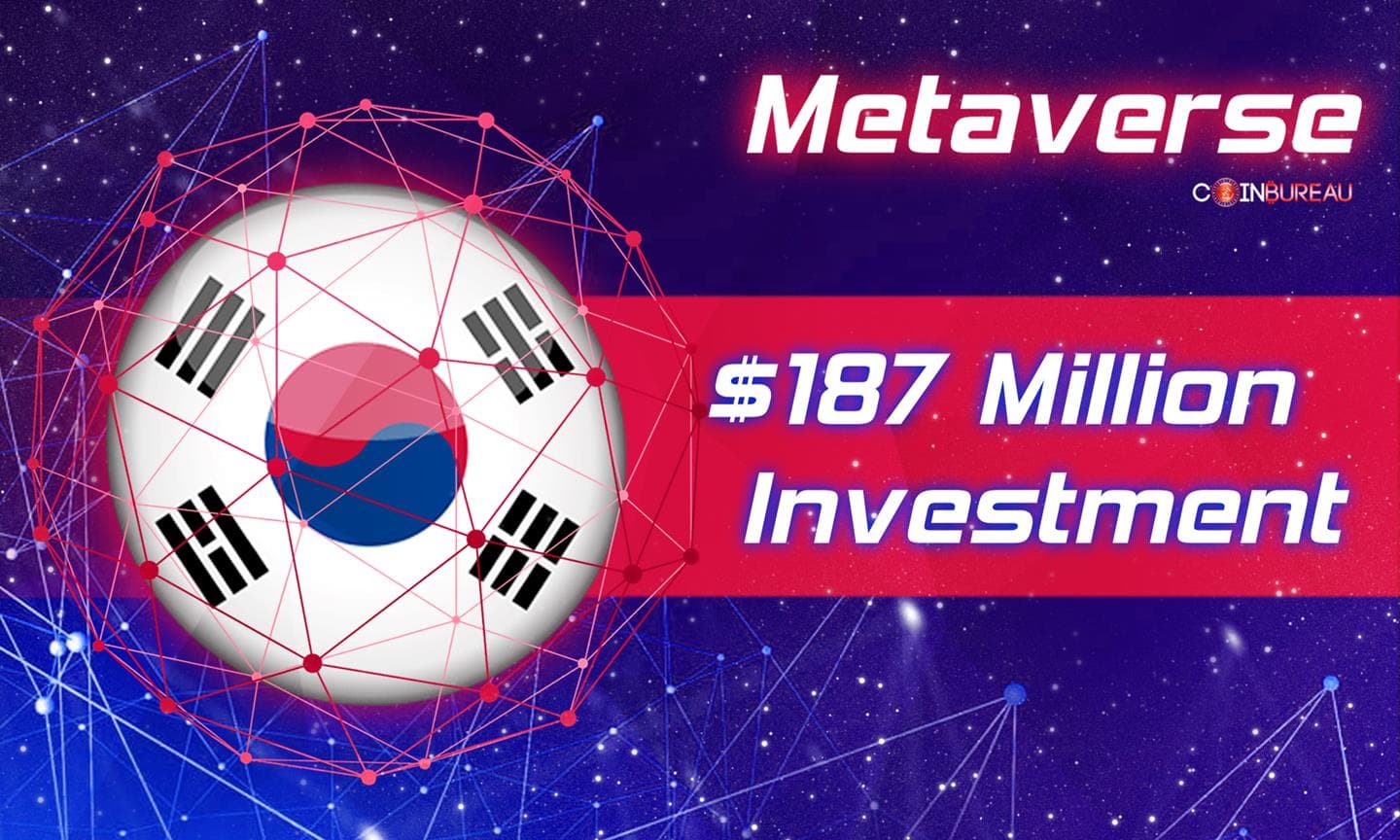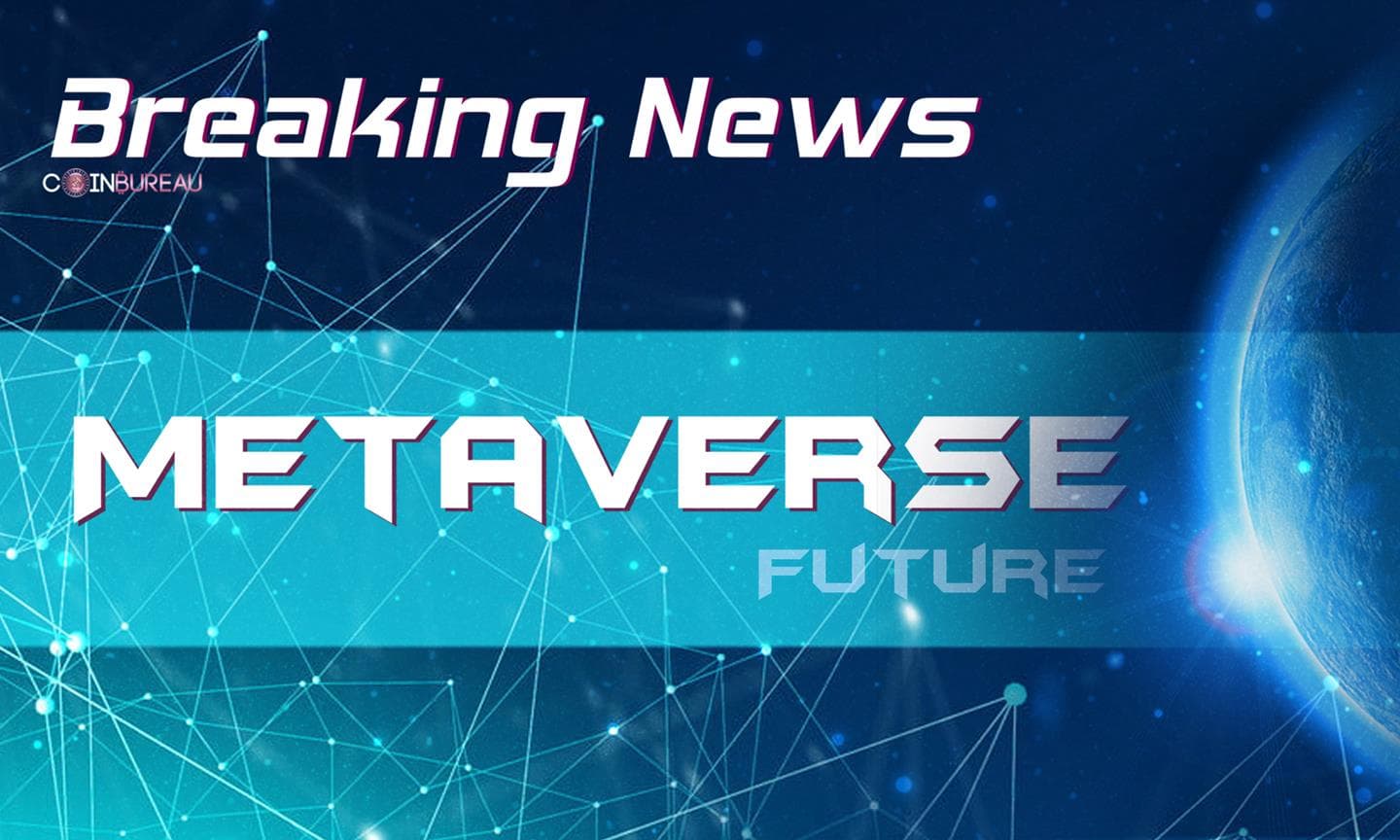As crypto investors, we are often seen as being a few fries short of a Happy Meal from traditional investors and “no coiners.”
We do sit at the brunt of a lot of criticism and scepticism in the investment space, didn’t you hear the news? Warren Buffett not only thinks Bitcoin is rat poison, but he wouldn’t buy all the Bitcoin in the world for $25 dollars!
Remember that Mr. Buffett also passed on Amazon and Microsoft stocks in the early days. The “Oracle from Omaha” has been wrong about a few things, so I don’t let that bother me.
Mr. Buffett talks about Bitcoin the way a heartbroken high school kid slanders their ex on social media after a bad breakup. Warren, what did that mean old Bitcoin do to you?
Maybe they are right, maybe our elevator doesn’t go to the top floor, and perhaps we are the investor equivalent of that guy who tries to eat soup with a fork.
Just when they thought we couldn’t go any madder as we buy “magic rainbow internet money” that has “no purpose or value”, we’ve raised the crazy bar and are now buying magic imaginary real estate in virtual fairy tale lands.
 Gif via Tenor
Gif via TenorIf we are crazy, talk about doubling down on our commitment and confidence in digital property.
What we are going to explore in this article is digital land and metaverse investing and go over why this concept may not be as crazy as it sounds.
Disclaimer: I invest in many of the projects mentioned in this article as part of my personal investment strategy. Nothing in this article is investment advice, metaverse investing is incredibly speculative and high risk. This article is for educational purposes only, do not make investment decisions based on the information presented here.
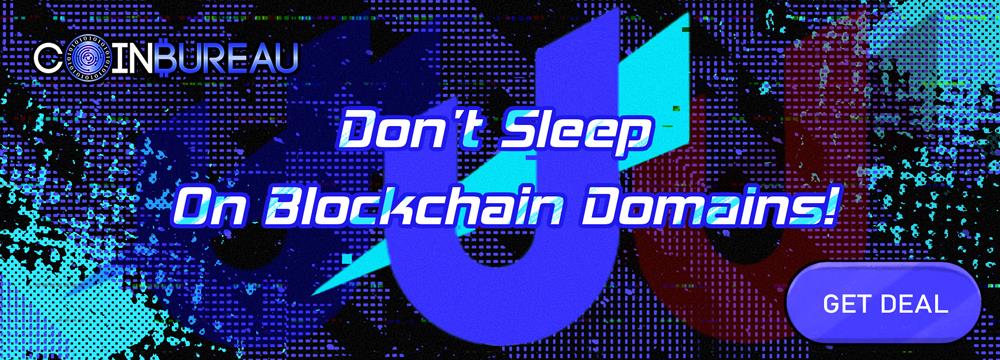
What is the Metaverse?
This is a doozy of a question; with no one size fits all answer. Asking what the metaverse is, is akin to asking someone what the internet is. You could ask 100 different people and receive 100 different answers.
The one important thing to note is that the metaverse is not just one place, it is a global collaboration, just as the very internet is. If you think about what the internet is, it isn’t Google, Facebook, or Amazon, it isn’t any single entity like that, it is a global space of information accessible to anyone and contributed to by everyone.
The metaverse is evolving to essentially work in a similar fashion and there are already multiple metaverses being built out. Facebook (yeah yeah, now “Meta,” I know) is building their own metaverse, Sony, Microsoft and Disney are building their own metaverses, and metaverses such as the Sandbox and Decentraland already exist and have a user base. There are literally dozens of metaverses already underway, so it isn’t going to be just one place.
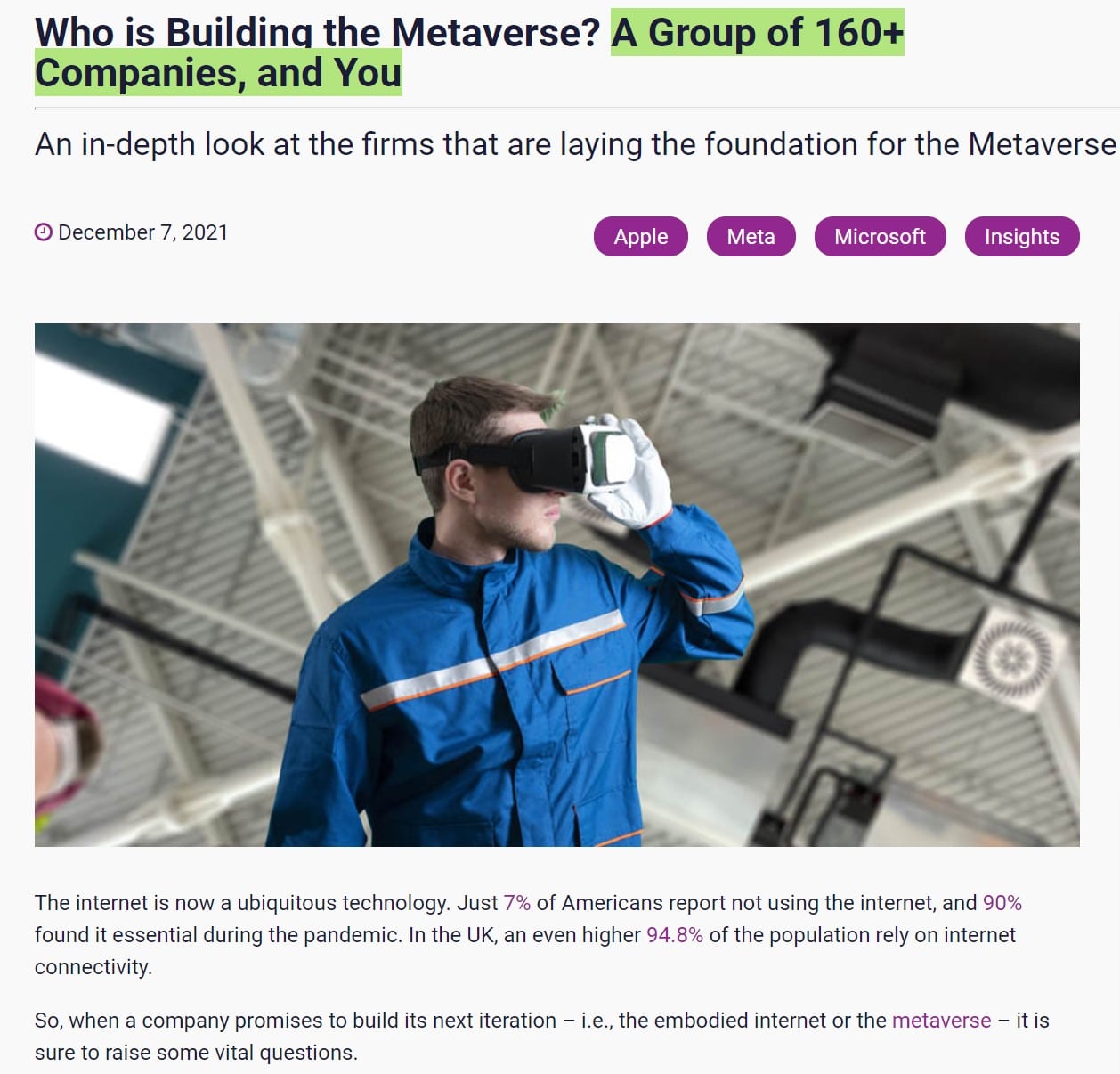 Image via xrtoday.com
Image via xrtoday.comMy personal feeling is that the metaverse is going to be the next evolution or iteration of the internet we already use, a web 3.0 version of the current web 2.0 that the internet is today. The metaverse will work hand in hand, symbiotically alongside web 2.
Eventually, the terms “metaverse” and “internet” may even be used interchangeably and used synonymously. Much like today, we simply use the term “website,” a term that hasn’t changed for decades even though the underlying technology migrated from pre-HTML, through to HTML 1, HTML 2… all the way to HTML 5, users seldom care as we still just refer to them as websites.
The key difference is that instead of accessing the internet with computers and smartphones, we will be fully immersed in these virtual worlds through virtual reality technology.
A very simple dumbed down explanation by Consensys sums it up beautifully, stating:
- Web 1 (early days of the internet) was read-only
- Web 2 (current iteration) is read-write as anyone can create and contribute content, aka “write”
- Web 3 is read-write-own. Instead of tech giants like Google, YouTube, Facebook etc. owning all your data, the user will own their data, content, and even part of the platform in a governance model
- Web 3 is a money layer for the internet
- Web 3 is an identity layer for the internet
I believe that just as you navigate to websites today for different companies and purposes, eventually, we will be navigating to different metaverses instead of websites. Some metaverses will be owned by companies while others will be community-owned and decentralized.
These decentralized, community-owned metaverses will be places where companies and users can exist and set up shop as equals, as we have already seen with the likes of JP Morgan who built the first digital bank in the Decentraland metaverse, and accounting giant Pricewaterhouse Cooper purchased land in the Sandbox metaverse.
 The Metaverse Will Likely be a Fully Immersive Way to Interact with the Internet. Image via Shutterstock
The Metaverse Will Likely be a Fully Immersive Way to Interact with the Internet. Image via ShutterstockThis movement has just started and we are already seeing insurance companies, banks, video game companies, news agencies, advertisement companies and more who are all building within these virtual worlds.
To get a firm grasp on what the metaverse and web 3.0 are, as these are massive topics to be explored on their own, we happen to have detailed articles that you should definitely check out. We have a deep dive explaining What is the Metaverse? and an article on Why Web 3.0 has Insane Potential.
If you are interested in going further down the metaverse rabbit hole, Guy also has a dedicated video on the top virtual land NFT projects:
Does the Metaverse Have Potential?
If you believe that the metaverse is the next evolution of the internet, as many do, then it is clear why there is limitless potential. If you asked someone in the early 90s how the internet may impact and shape the future, I doubt anyone would have been able to predict or fathom just how revolutionary the internet would become.
The metaverse is likely to eventually encapsulate every company website, and everything we use the internet for today will take place in the metaverse. Gaming, shopping, working, tv and film watching, banking, and countless other things will likely become primarily conducted virtually. If you recall from my article on the future blockchain gaming, an estimated 1/3 of the planet’s population are considered gamers, a figure that is growing and attracting more people to gaming metaverses.
Just as most of us were not aware of our website browsing making the switch from HTML 4 to HTML 5, the 4.95 billion people on the planet who use the internet today, whether they know it or not, will be riding the internet train right into web 3, and potentially, the metaverse. Remember that internet adoption did not happen all at once, it was a trickle of users, that turned into a stream, that turned into a tidal wave, it is probable that metaverse adoption will follow a similar trajectory.
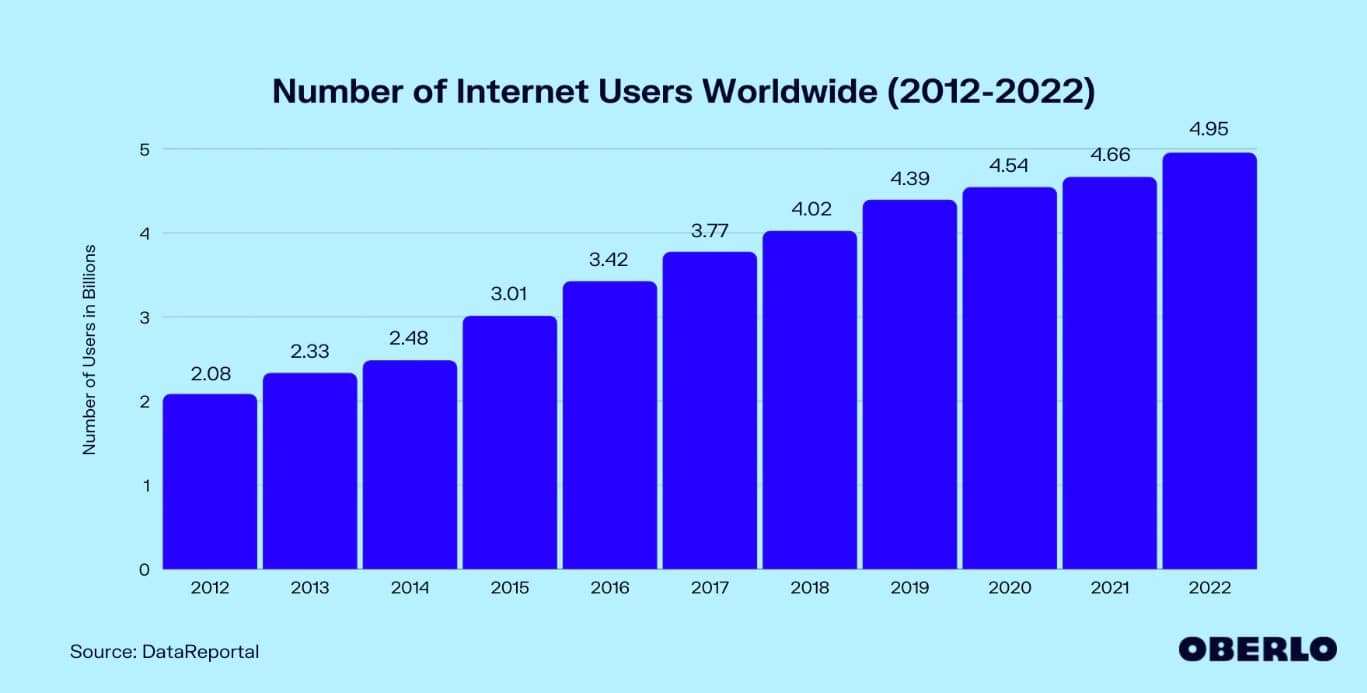 Image via oberlo.com
Image via oberlo.comIf you could go back and “own” a piece of the internet in the 90s, wouldn’t you want to? Many see metaverse investing as a way to actually own a piece of the future infrastructure that will make up a huge part of our daily lives.
The opinion that we will be spending the majority of our time in a metaverse is echoed by many such as Microsoft and Facebook’s Meta.
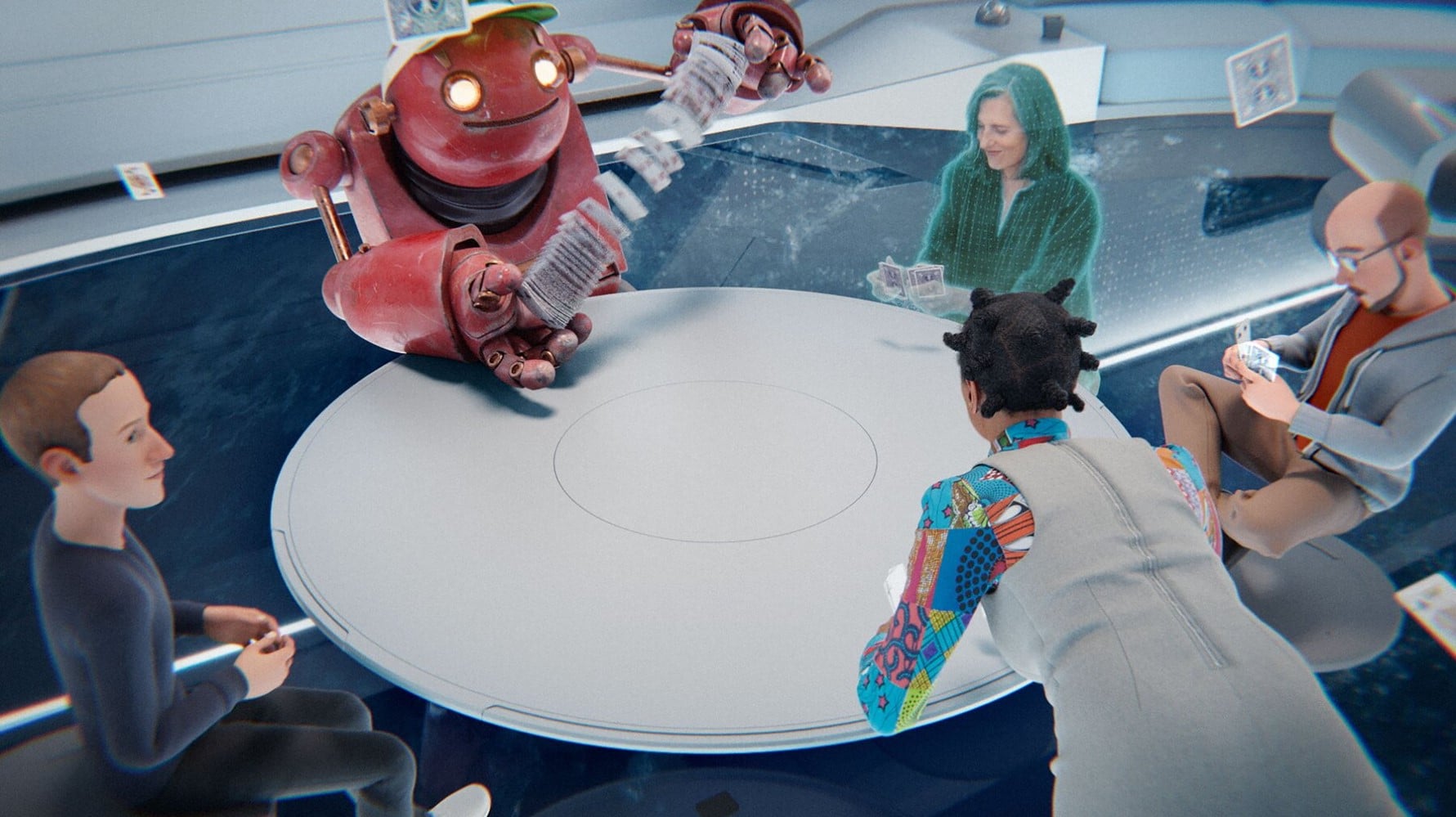 Meta’s View of the Metaverse. Image via New York Times
Meta’s View of the Metaverse. Image via New York TimesWhile a totalitarian metaverse run by Zuckerberg as judge, jury, and executioner, scares the bejesus out of many of us, their video about the metaverse that shows all of us just chilling out and socializing in the metaverse, chatting, playing games, working, and more, I feel is a pretty good portrayal of a metaverse, but how about we use one not controlled by data-hungry, fear-mongering tech giants.
Heck, even Mcdonald's, Chipotle and Wendy’s have launched virtual restaurants in the metaverse, so yeah, it’s a thing.
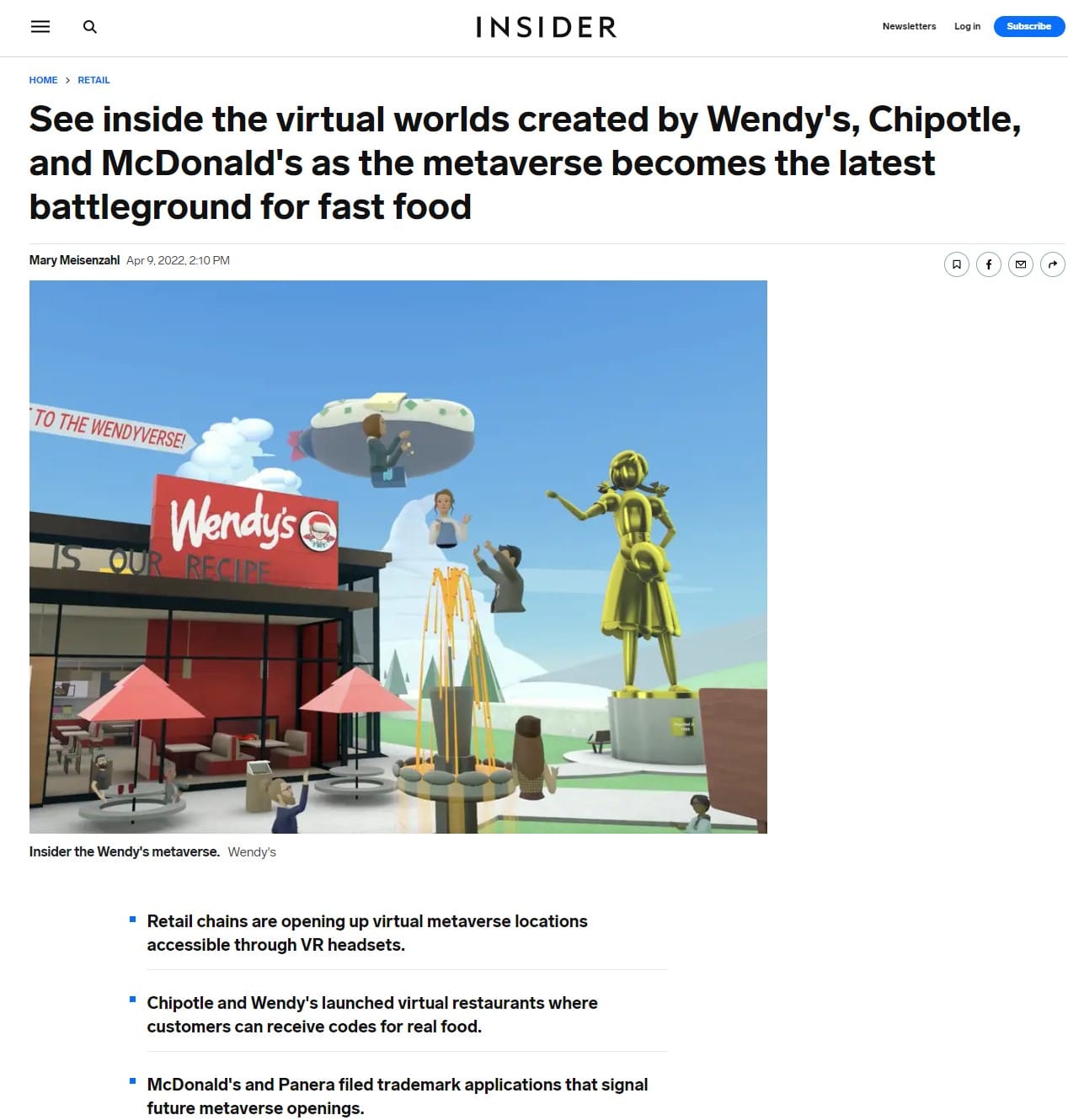 Gonna Need a Virtual Diet Plan to Work Off These Virtual Calories Image via Business Insider
Gonna Need a Virtual Diet Plan to Work Off These Virtual Calories Image via Business InsiderThe metaverse will be accessible by anyone with a simple internet connection. This opens up companies to a potential global customer and client base without the logistical headaches and overhead costs of needing to physically expand your business into other countries.
Collaboration will be able to thrive and exist at levels never before possible, creating limitless innovation, the likes of which we cannot even imagine today. Imagine the things that will be possible in a virtual world not restricted by the physical limitations imposed on us in real life.
Let’s take a look at some fast facts:
- Sandbox LAND grew by over 15,000 percent in 2021
- The Metaverse is believed to someday become a multi-trillion-dollar industry
- 2021 saw an average of 180 land/property transactions per day for the Sandbox, talk about a liquid real estate market!
- Companies and institutions are investing billions in the Metaverse
- The four biggest metaverse platforms saw sales reach over $500 million in 2021, and are expected to hit $1 billion this year
- There are only around 25,000 individual crypto wallets that hold metaverse real estate, so we are still very early.
It is pretty clear as to why there has been billions of dollars flowing into metaverse investment and development as this is likely going to be the place we all hang out in the near future. Think every hour we spend staring at screens now will likely translate directly to time spent in the metaverse. But what is digital real estate specifically, and what makes it so attractive?
What is Metaverse Real Estate?
Metaverse real estate is parcels of land or property that exist in virtual worlds. In their most simple sense, they are pixels of land that make up a broader landscape that can be purchased and owned by connecting a cryptocurrency wallet, and accessed through a device with internet connection.
Digital land is more than just digital images as they are programmable. Users can design them how they want and spend time there. Think of it like Minecraft but the key difference being that you actually own your items, can transfer them out of the world, and sell them for real-world monetary value.
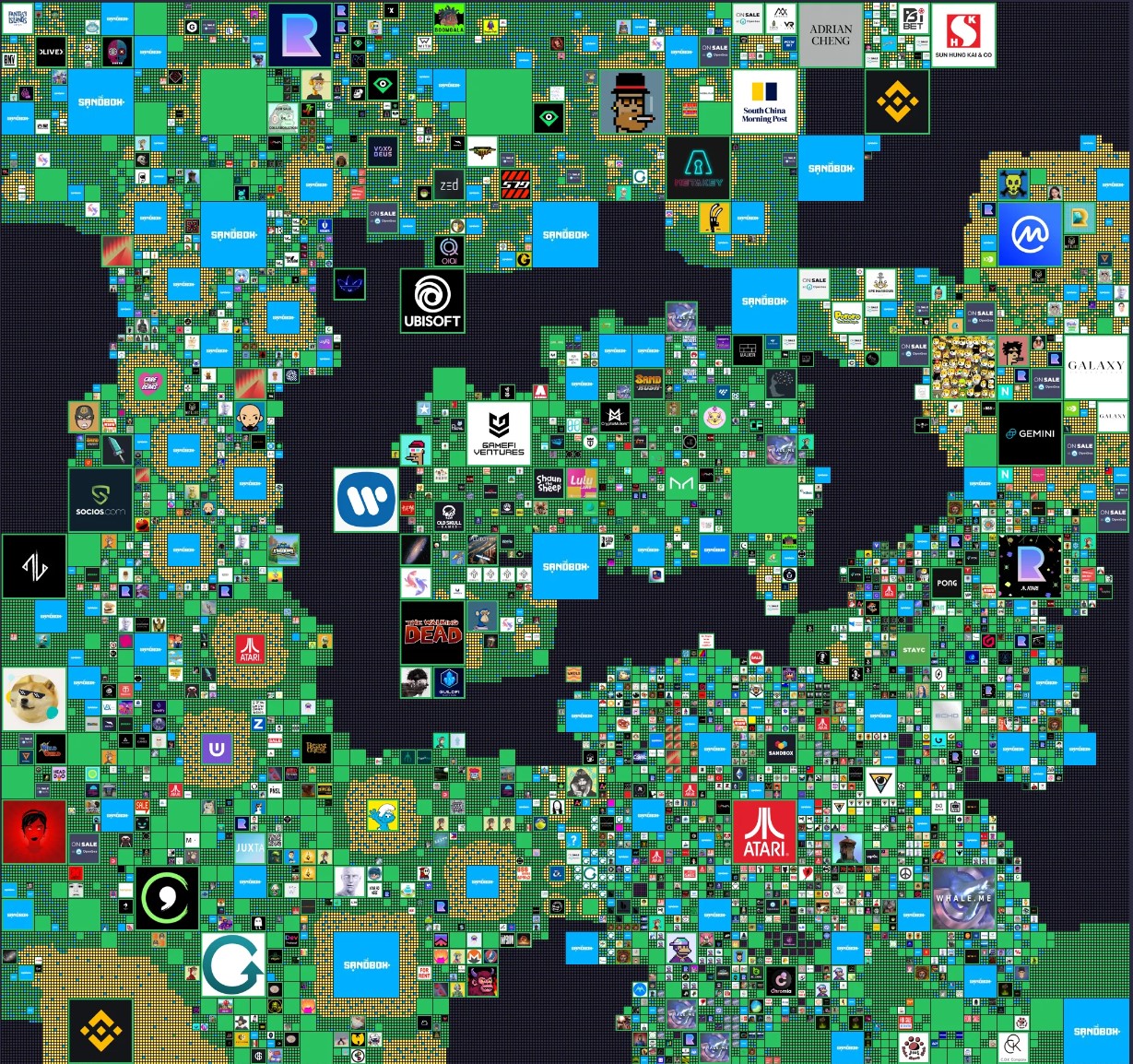 A Look at the Land Parcels Owned by Users in the Sandbox Metaverse. Image via Sandbox
A Look at the Land Parcels Owned by Users in the Sandbox Metaverse. Image via SandboxA common misconception about virtual real estate is that you need technical skills to participate which isn’t the case for most metaverses. Popular metaverses like Decentraland have an intuitive drag and drop interface where users can create whatever they like with no coding skills required.
With the rise of the metaverse, which attracts investor, company, and retail interest, the digital real estate industry is expected to grow. The virtual real estate market experienced a boom in 2021 after Facebook changed its name to Meta and announced its focus on creating a metaverse. As popularity in metaverses grows, virtual real estate is forecasted to have a CAGR of 31.2% from 2022 to 2028.
What Gives Digital Real Estate Value?
You might be asking yourself why anyone would want to invest in digital land, as it does seem a strange concept. After all, you can’t build physical property on it, you can’t physically live on it, and you might even be thinking it isn’t even scarce.
The planet earth only has a finite amount of land, which is what makes land valuable in attractive areas. A common criticism against virtual land is that we can create endless virtual worlds with limitless virtual land. We could create so much virtual land that everyone on the planet could have free access to as much land as they want, reducing any value in digital real estate at all.
Anyone with any basic economic understanding realizes right away why investing in something with a limitless supply isn’t always the best idea. This is one of Bitcoin’s strongest narratives over fiat currency as there is nothing stopping the Fed from creating new money out of thin air as we have seen in record numbers since the pandemic. Bitcoin's finite supply is one of the reasons many people believe that there should be a Bitcoin standard and why Bitcoin could become the world reserve currency.
 Image via twitter.com/zackgianino
Image via twitter.com/zackgianinoThe ability to create an endless supply of digital land is a very valid concern, and one of the things that make metaverse investing so risky. A good metaverse investment comes down to the popularity/adoption of a metaverse and something known as network effect.
We see how impactful and important network effect is on social media sites with Facebook being a great example. Everyone you talk to seems to hate Facebook and emperor Zuckerberg, yet everyone still uses it. Why?
Simple, because everyone else is already there. If all your friends, family and favourite brands are on Facebook, as much as you may hate it, what is the alternative choice? You could go and start up your own, or find an alternative social media site, but if nobody else follows you, it’s no fun and pretty lonely being the only person using a different social media site.
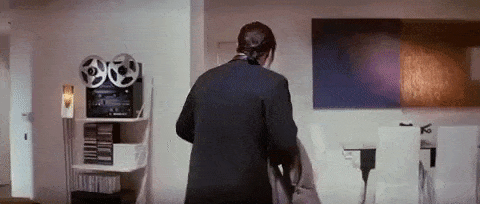 When None of your Friends use MySpace Anymore. Gif via VSGIF.com
When None of your Friends use MySpace Anymore. Gif via VSGIF.comMetaverse dominance will have the same network effect principles in play. The two largest metaverses in terms of active users today are the Sandbox and Decentraland. Both of these metaverses have a finite supply of land, giving it value.
In fact, plots of land in Decentraland have been selling for millions of dollars which is astonishing! Who would have thought that digital land would be selling for more than physical land? Once you dive into it as we will in the next sections, you will see why this isn’t as crazy as you initially think.
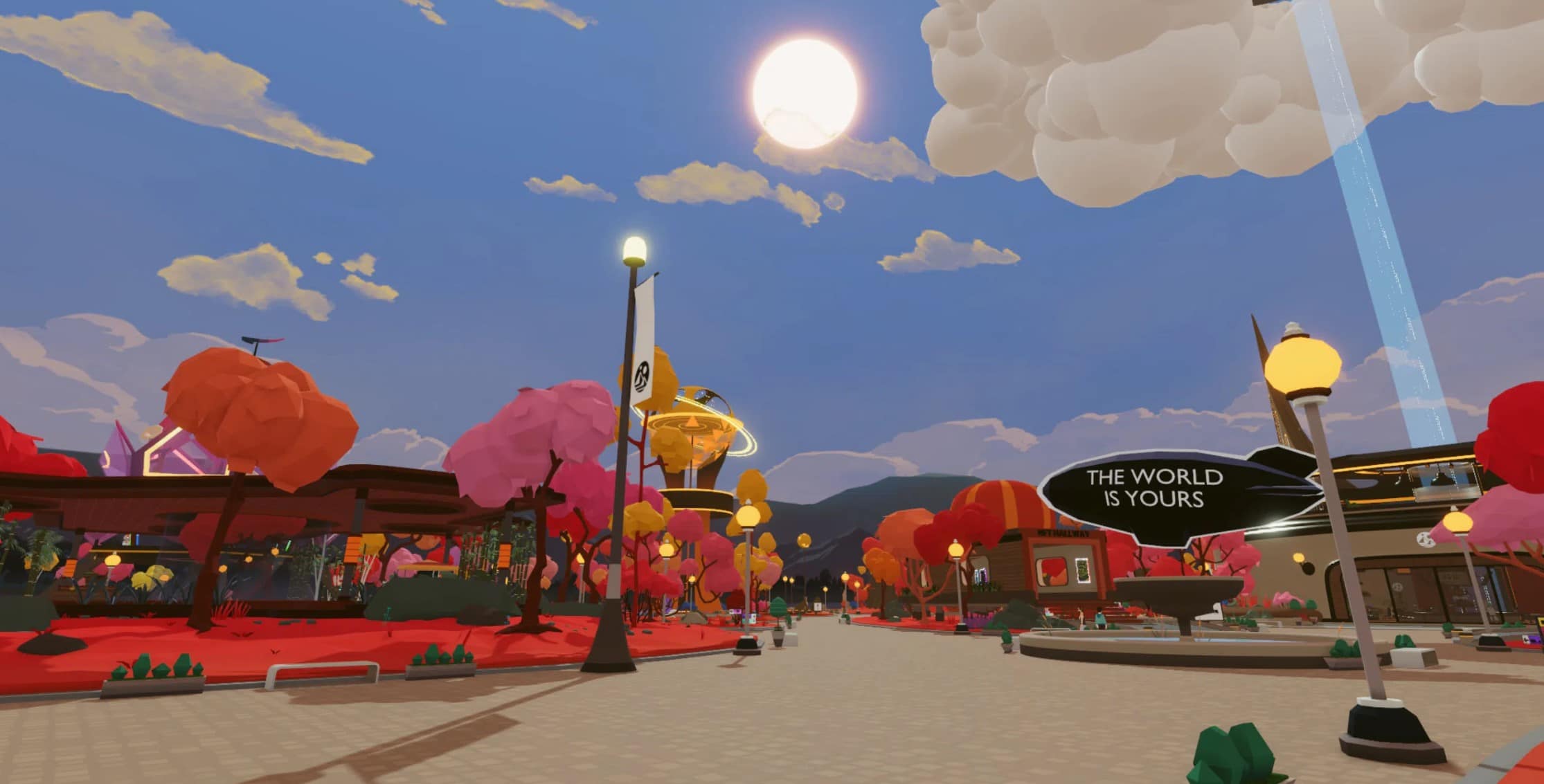 Fashion Street Estate in Decentraland sold for $3.5 Million (618,000 MANA) Image via decentraland.org
Fashion Street Estate in Decentraland sold for $3.5 Million (618,000 MANA) Image via decentraland.orgAs mentioned, there is finite land available in metaverses like Decentraland and the Sandbox, and similar to how a plot of land in a place like New York is going to cost considerably more than some backwoods land in the middle of nowhere that nobody wants to visit, these metaverses also have plots of land that cost more as they are in more desirable locations than others.
Here is a heatmap showing cost of land in the Sandbox, highlighting that more centrally located plots are more desirable, and therefore, worth more.
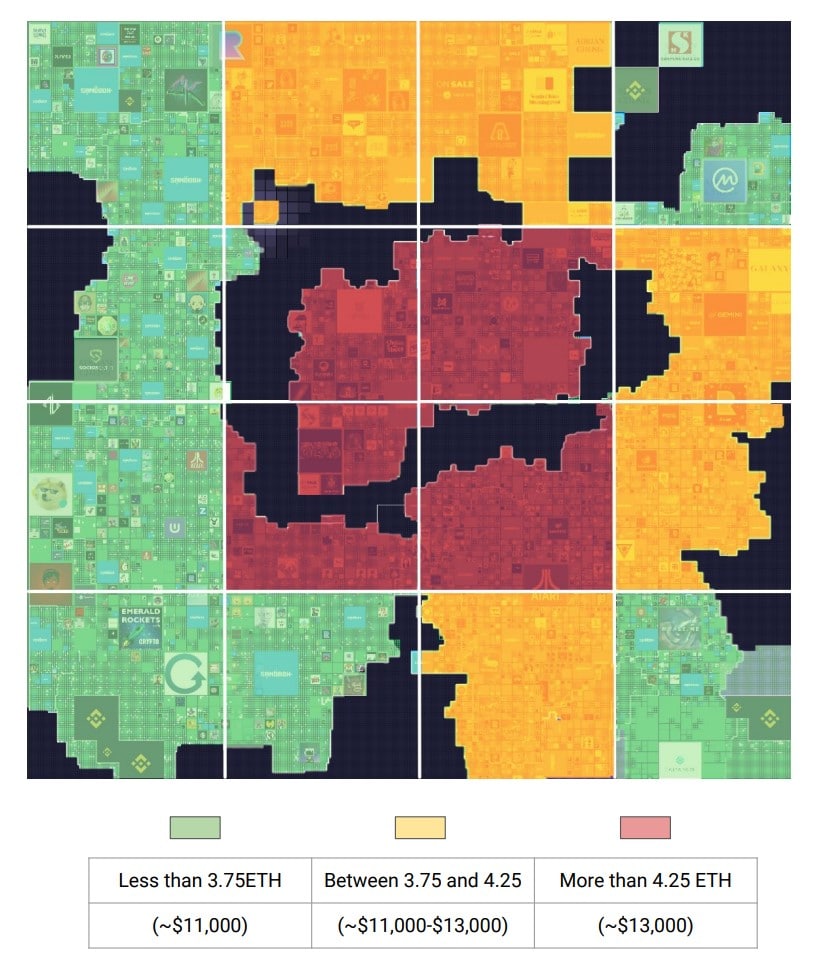 Image via CFTE report
Image via CFTE reportSnoop Dogg is one of the biggest celebrities who firmly planted a flag in the metaverse. The plot of land beside his mansion in the Sandbox sold for $500k, not because there was anything particularly special about it, other than you get to be neighbours with Snoop Dogg.
So, going back to the concern that we can just create another Decentraland or Sandbox, and create more virtual worlds, the network effect is powerful as there is only one Snoop Dogg, and only one tv series: The Walking Dead, and they chose to hang out in the Sandbox. There are already thousands of users in Decentraland, along with Samsung, JP Morgan, Vegas City, and gaming giant Atari to name a few. So yeah, we can create another world, but I want to hang out in Decentraland, playing Atari.
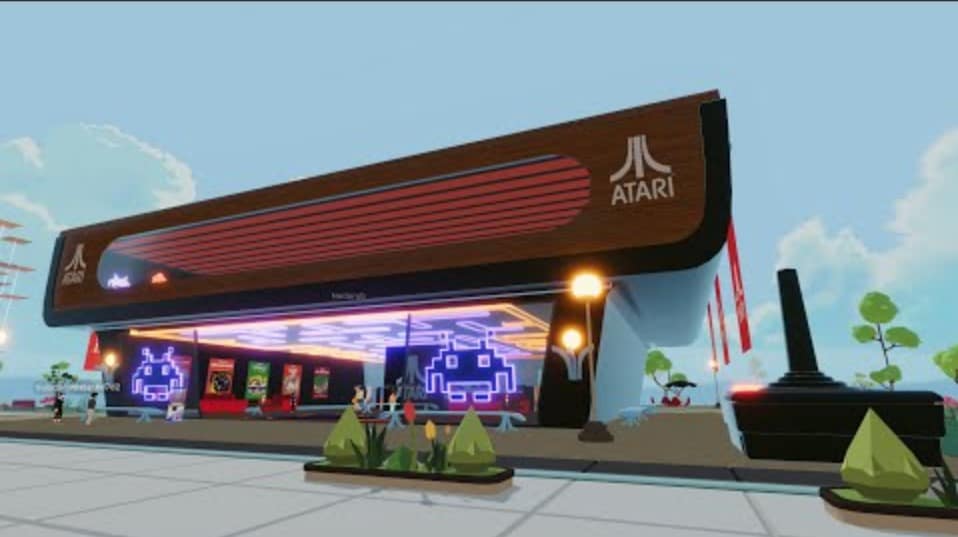 Atari in Decentraland Image via YouTube/Peanutbutta
Atari in Decentraland Image via YouTube/PeanutbuttaIf all your friends are in one metaverse, and gaming giant brands and entertainment companies, along with sporting events and fashion companies that are important to you are in the same metaverse, that network effect reduces the likelihood of newly created metaverses that have none of that devaluing the land owned in an already well-established blue-chip metaverse project.
Supply and demand are factors that also play a role in land value within a metaverse ecosystem, but it is ultimately adoption, popularity and network effects (along with useability, of course,) that will give one metaverse value and demand over competing metaverses. These are the main factors that need to be considered when deciding whether or not digital land is a viable investment.
Digital Land vs Physical Land
Trying to understand why anyone would opt for digital real estate over physical real estate is a hard point to pass across the table to someone who is big on physical assets and traditional investing, and I get it.
I am going to take from my own experience here and make a comparison for anyone who is interested in Bitcoin but has not made the leap to understanding the value of digital land yet, as similarities can be drawn by comparing digital land to physical land, as we can compare Bitcoin to physical cash or gold.
There are a lot of people in the world whose main financial goal is to own a house with a paid-off mortgage, a sentiment that I agree with, as it is likely the best scenario for most people. Imagine all the extra disposable income you would have if you didn't need to pay rent or a mortgage. Buying a house vs renting is a topic that I have researched at length in the past and is not as black and white for everyone. For example, did you know that in Germany and Switzerland it is more favourable to rent than it is to own?
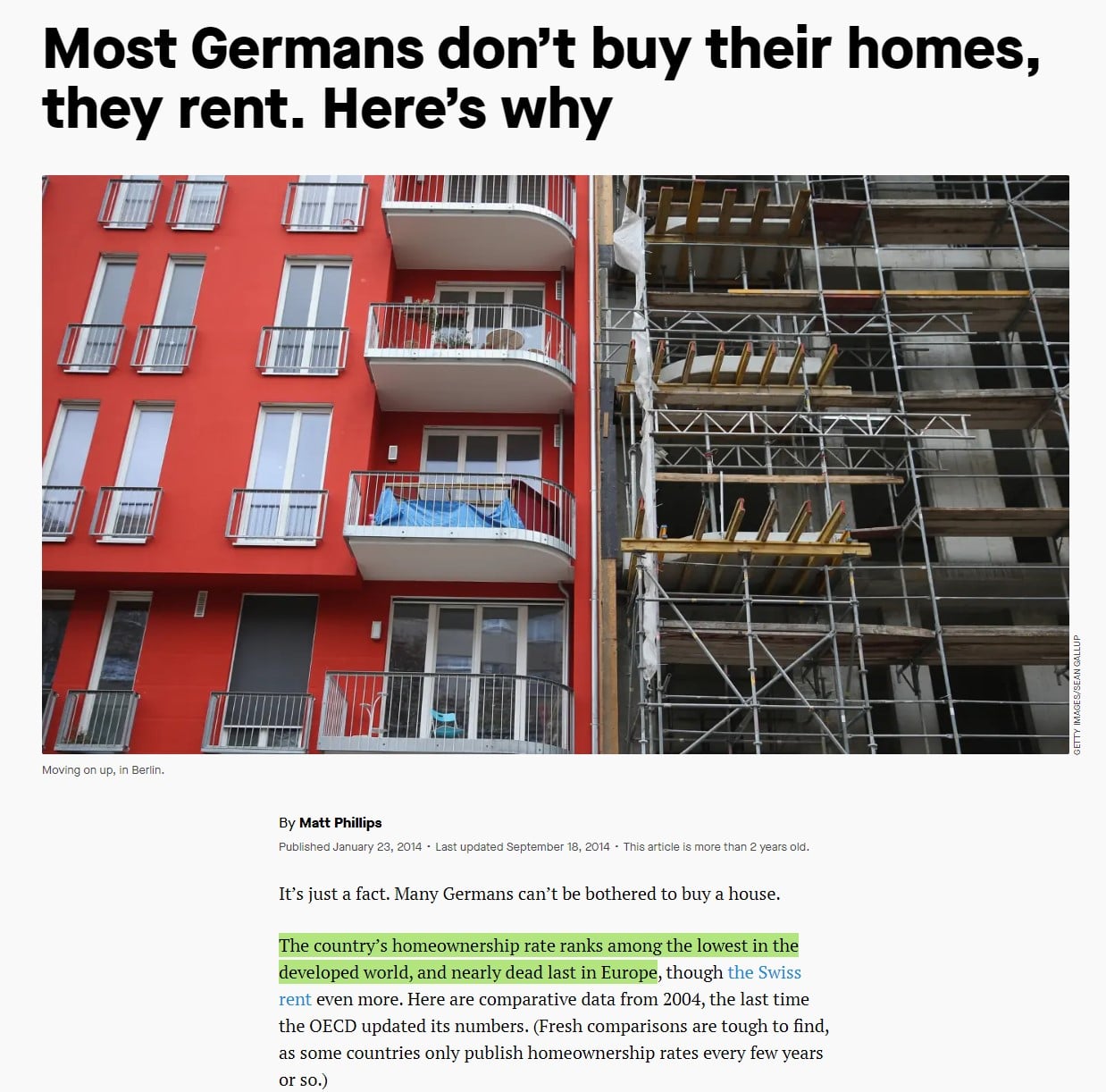 Renting is Preferable to Buying in Germany and Switzerland. Image via qz.com
Renting is Preferable to Buying in Germany and Switzerland. Image via qz.comArguments can be made that real estate is a money pit and not always a good investment. In many countries, real estate does not appreciate as well as other assets, and since the 2008 financial crash, real estate has been steadily depreciating in some countries. In many parts of the world, investors would be better off throwing money into an index fund than purchasing a home, but these are topics for another time.
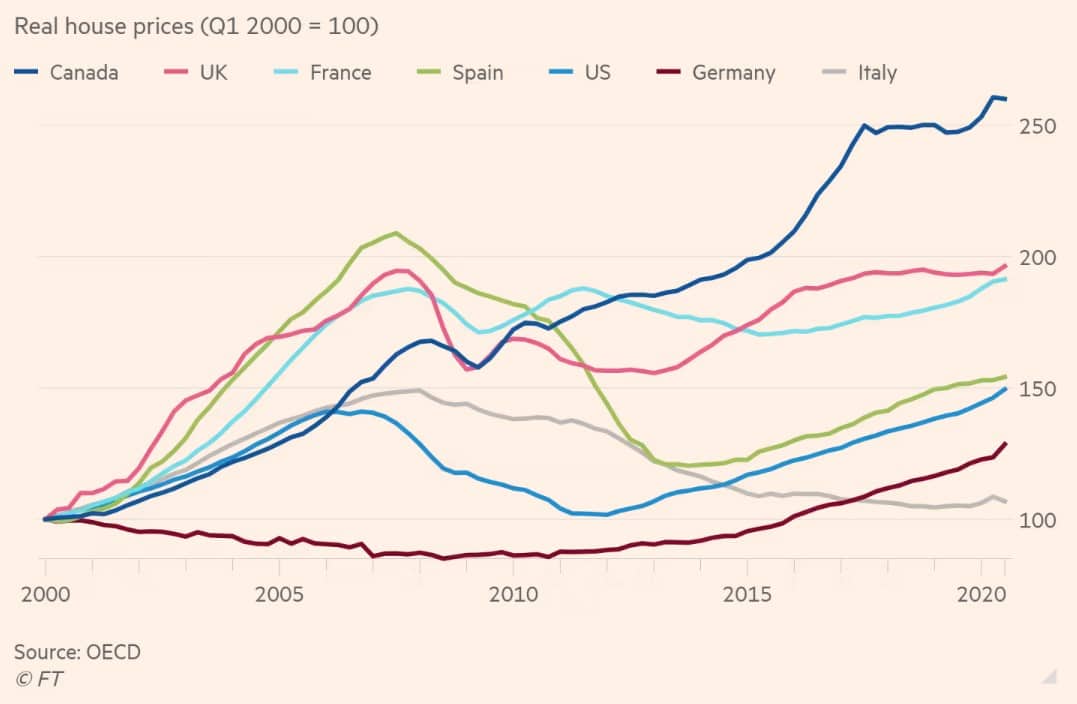 Real Estate Investment Profitability is Highly Dependent on Location. Image via Financial Times
Real Estate Investment Profitability is Highly Dependent on Location. Image via Financial TimesFor me, I love the idea of having physical real estate, a tangible asset that I can live in and build on, and to know that I always have a roof over my head in case the world goes to hell in a handbasket. I would like to have one physical home for security, not necessarily as an investment, before investing in speculative digital property.
Though with that being said, in full transparency for you guys as I don’t want to be hypocritical, I actually own digital land and property, but no physical property, which is something I am looking to change.
This wasn’t entirely my choice, in my article about whether or not you should get paid in cryptocurrency, I told the story about how I used to earn a salary in Bitcoin, and damn near got laughed out of the bank when I tried to apply for a mortgage. So, I thought screw it, if I can’t buy a real home, I’m going to buy virtual land and aped into Bloktopia and other projects where I am earning some sweet passive monthly income (more on that later).
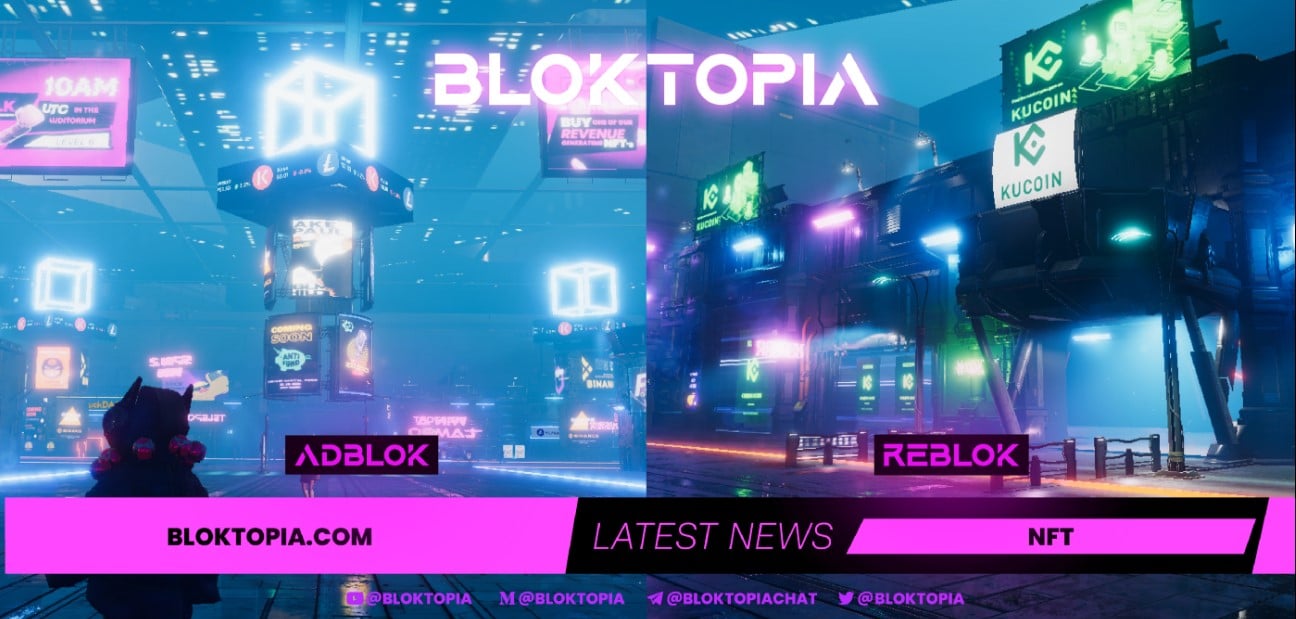 Image via medium/Bloktopia
Image via medium/BloktopiaAvailability is a great distinction that separates physical and virtual property. For many of us, getting a mortgage or buying property can be unattainable for multiple reasons. There are far fewer barriers to entry when opting for virtual land, essentially anyone with the internet and the capital can do it.
If you can spot good opportunities early, you can get in for a fraction of the cost of physical real estate and the ROI on digital land sales has smashed the physical real estate market out of the park. Some of these plots of land were purchased for mere dollars and later sold for millions, something not seen in the physical realm.
If you are on board with Bitcoin, then you likely understand why it is superior to fiat money and gold due to the following principles:
- Bitcoin is More Durable than Fiat
- Bitcoin is More Portable than Fiat or Gold
- Bitcoin is More Divisible than Gold
- Bitcoin Is Uniform
- Bitcoin Is Scarcer than Fiat or Gold
- Bitcoin is More Secure than Fiat
- Bitcoin can be transferred anywhere in the world nearly instantly for very low cost, gold and fiat cannot.
You can apply these same principles to digital land vs physical land.
Digital land is more durable than physical land- Digital land and real estate are not subject to the same hazards as physical property. No need to worry about floods, earthquakes or natural wear and tear, nor do you need to worry about upkeep and maintenance costs.
Digital land is more portable than physical land- Your virtual real estate can be accessed and utilized from anywhere in the world so long as you have an internet connection. Also, with cross-compatibility with NFTs, if you don’t like where your digital house is built, you can pick it up and transplant it somewhere else, even between metaverses someday.
Imagine saying you are tired of your apartment in New York, or your neighbourhood has become a rough area, good luck picking up your home with all its furnishings and transplanting it to another country or city. That will be theoretically possible with digital land. You can also sell or transfer your digital real estate nearly instantaneously to anyone located anywhere in the world; borders are a restriction that virtual property does not need to abide by.
Digital land is more divisible- With fractionalized NFTs, groups of investors can share the cost and get involved with joint ownership of land and real estate far more efficiently and to a greater scalable degree than the traditional real estate industry, without pesky banks and property rights/title deed regulations getting in the way.
There is nothing stopping you from drawing a contract up with a group of friends or family and entering a joint venture into digital real estate investing. Plus, with smart contracts, this can all be done in a trustless and permissionless way so you don’t need to worry about people backing out of the deal or being shady.
Back to the real world, there are rules and regulations in place that stipulate how many names can be on a mortgage, or how many names can be on a property title which can be a burden and a barrier. Blockchain often removes these intermediaries who enforce arbitrary rules, creating a more free and equal system.
Digital real estate can have the same principles of scarcity as physical real estate- As mentioned, there is a finite supply of land available in some of these metaverses, just as is the case with the real world. While a valid argument is that we can just continually create more virtual worlds, there will still be scarcity driving value if you want prime real estate in prime metaverse locations.
Just for fun, here is a chart that shows what factors drive property value from a traditional perspective that we can compare to digital property:



How to Capitalize on Digital Land Investments
One of the most revolutionary features of the metaverse and digital land is that virtual worlds can be created without the restrictions or restraints that are present in the physical world. Things like gravity, thermodynamics, and physics do not need to be adhered to, meaning that the only limitation is human imagination.
Now, admittedly, I am not the most imaginative person on the planet, and I am sure you can come up with more creative and innovative ideas than I can, but what started opening my eyes to the possibilities of the ridiculous beauty that can exist in the metaverse was during the Cardano 2021 virtual summit. The event took place on the back of a giant turtle, surrounded by floating islands which is pretty cool imo.
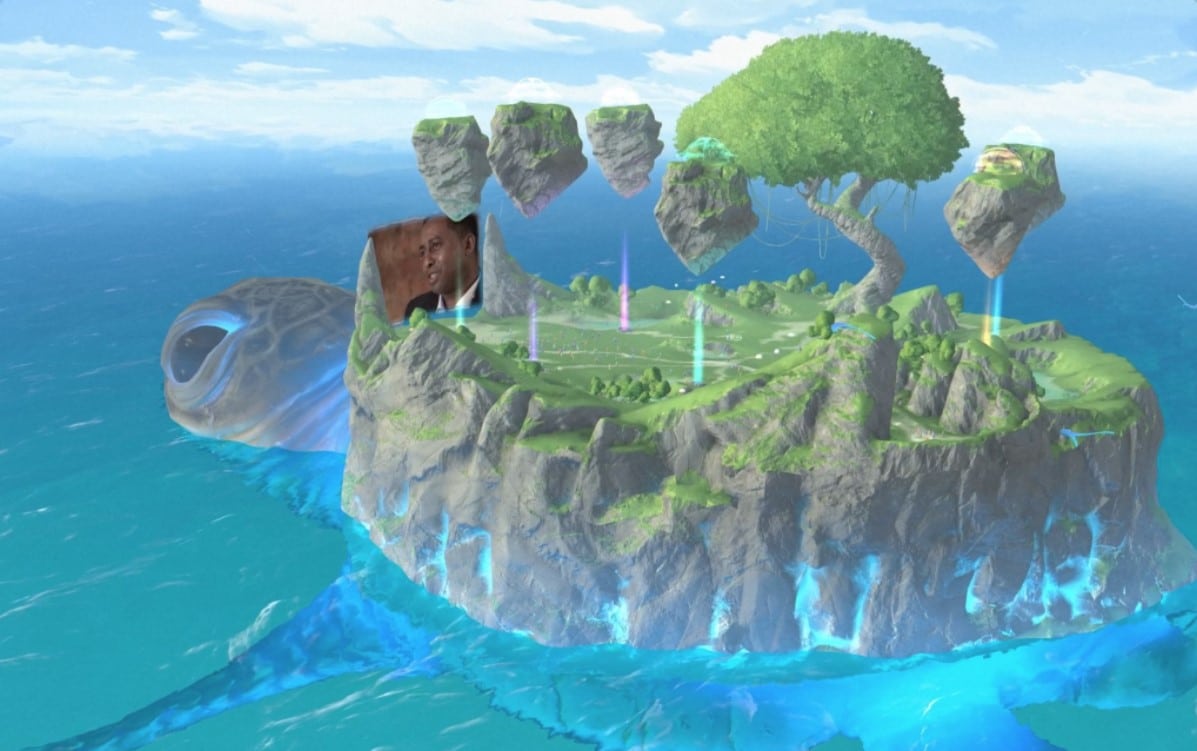 2021 Cardano Summit. Image via dreamwave.tech
2021 Cardano Summit. Image via dreamwave.techPhysical land acquisition has the burdens and hurdles of intermediaries, deeds and titles that need to be transferred, financial party interest, and endless red tape dictating what you can and cannot do with “your” property.
We can’t even begin to imagine what the full form of the metaverse will look like with the randomness of a global collaboration of the imaginations without limitations from a global population. Some metaverses will be like something out of a Dr. Seuss picture book times a million.
That same imagination can be utilized to figure out the endless ways you can monetize your virtual real estate. You want an underwater M.C. Esher style home complete with friendly dolphins? You can do it, maybe charge a cheeky little entrance fee for visitors.
We have already seen virtual concerts from the likes of Post Malone, who rocked out on stage with Pikachu. Ariana Grande, The Weekend, Justin Bieber and Snoop Dogg have also performed in virtual reality venues.
 Post Malone Performed in a Virtual Concert to Celebrate Pokémon’s 25th Birthday. Image via telegraph.co.uk
Post Malone Performed in a Virtual Concert to Celebrate Pokémon’s 25th Birthday. Image via telegraph.co.ukIf you own a large enough parcel of land, you could be the one to rent it out for these virtual concerts, sports matches, conferences, build virtual movie theatres, arcades, bowling alleys, casinos, you name it!
Advertising is also going to be paramount in the metaverse, think about all the advertising that exists on the internet today, that will all need to find a home in the metaverse. If you own land that is likely to see a lot of traffic, advertising and marketing agencies are likely to pay a fortune for the chance to put their brand up at your place.
One of the common methods that I have used to earn monthly income from the metaverse is to rent out real estate to companies who want their brand seen in the metaverse. For me, this happens in Bloktopia. This works the same way as renting out office space to tenants in a physical building. My other metaverse income comes from staking and renting out GameFi NFTs to players around the world, so there are a few different ways to capitalize here.
As long as you have a piece of land in a metaverse/area that people will want to visit, the sky really is the limit for all the different ways you can monetize it. Or, for a passive approach, many investors are simply flipping digital land as it can often be purchased and then sold later for a profit.
Where to Buy Metaverse Real Estate
This is the million-dollar question that everybody wants to know, isn’t it? The truth is, nobody has a crystal ball, and nobody knows which metaverses will succeed and which ones will fail, nor do we even know if virtual real estate is a good investment at all, which is why it is classified as high risk and highly speculative.
We could all look back in ten years and go “hey, remember when we were all dumb enough to buy virtual land?” Then cry into our pile of Beanie Babies and Pogs that we also thought would be worth something someday.
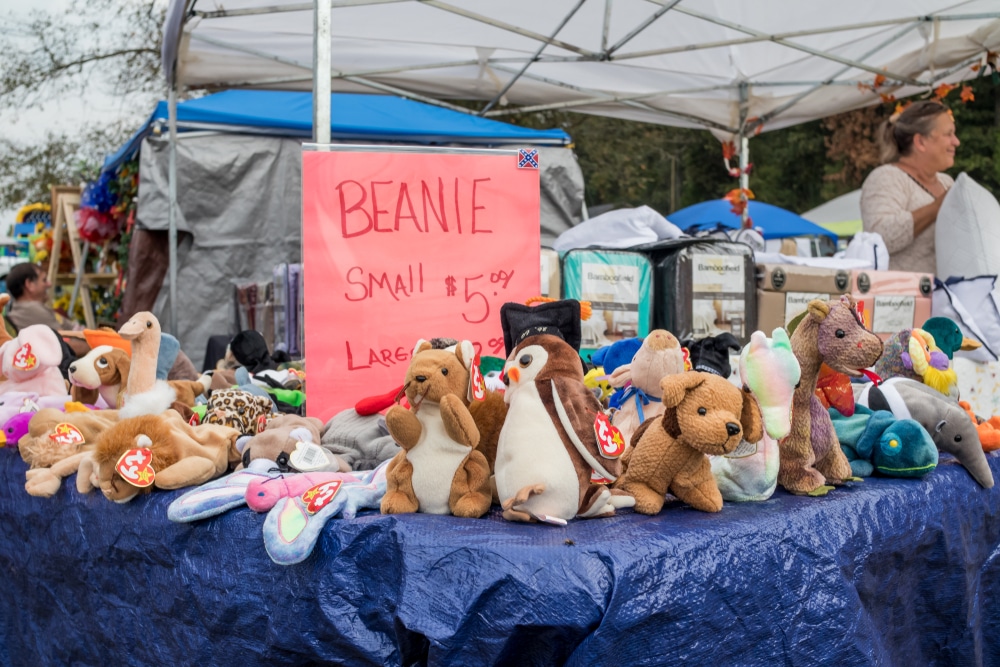 How Many People Spent Fortunes on These Thinking They Would Sell for Millions Someday? I Wouldn’t Trade a Can of Beans for one Nowadays. Image via Shutterstock
How Many People Spent Fortunes on These Thinking They Would Sell for Millions Someday? I Wouldn’t Trade a Can of Beans for one Nowadays. Image via ShutterstockWhen weighing up metaverse investment potential, as with any risky investment, the first thing you should ask yourself is if you have enough “disposable” money to throw into a metaverse investment. Any money that goes into highly speculative assets like cryptocurrency should be money that you can afford to lose, which is why nearly every financial advisor and honourable crypto personality will tell you that same thing.
If I had people in my life who were dependent on my income and I did not own my own home and struggled financially each month, the last thing I would be investing in is metaverse projects. If you do decide to take a crack at metaverse investing, then the traditional methods of valuing real estate should apply to your investment decision. These are things like:
Location- Who are the owners of the land in your neighbourhood? Landowners in the Sandbox have raked in masses of income when big brands like Atari, Samsung, and Adidas set up shop next door.
Is the location in a desirable area that you will likely be able to sell for a profit later on?
Network Effects- Are there enough attractions, brands, and big names in your metaverse to continuously fuel engagement and attract users?
Cost- Like any investment, there are good times to buy and bad times. Many virtual real estate investors bought in at the peak of the 2021 metaverse mania only to watch the value of their properties drop significantly in value, some as much as 70% or more.
Ability to Monetize- The more factors driving traffic to your area will increase your ability to monetize the property and set up additional income streams, or simply increase the value of your investment.
How Long You Are Willing to Hold- Many consider metaverse investment as long term with a 5-10+ year outlook.
The majority of metaverse real estate sale activity happens in the top two names in the space, Decentraland and Sandbox. These are considered the safest, “blue chip” metaverse investment plays. Other mentions that are gaining in popularity and growing are the likes of the Solana powered Somnium Space, Star Atlas, Cryptovoxels, Big Time, Bloktopia, and the Cardano powered Pavia metaverse, along with many other fantastic looking ones in the pipeline.
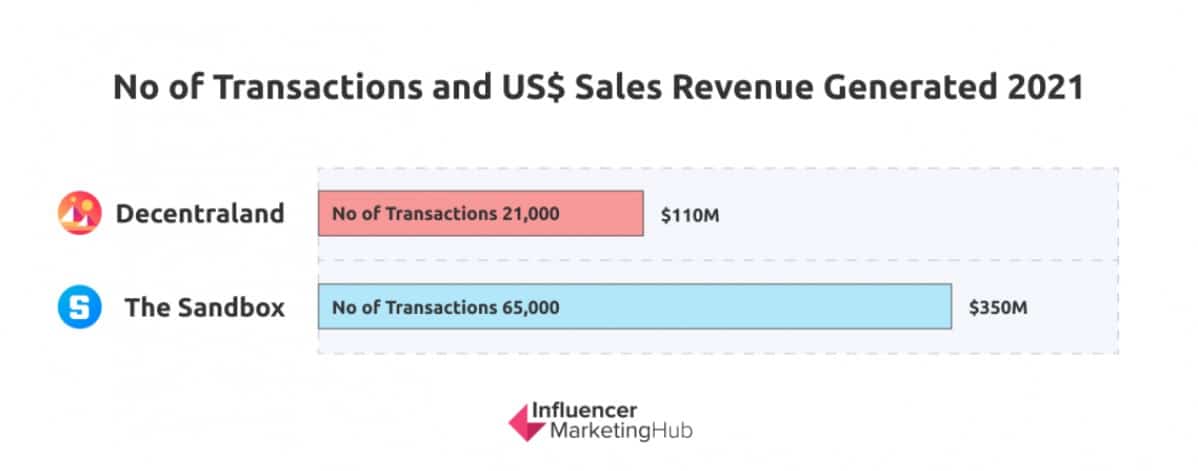 Image via Influencer Marketing Hub
Image via Influencer Marketing HubSandbox is the leader, dominating approximately 62% of the entire metaverse real estate market. During the 2021 virtual land boom, LAND in the Sandbox was going for an average of $11,000 for a tiny parcel, with higher-end lots going for six figures. Since the hype has died down, Sandbox LAND is now selling for an average price of $3,100.
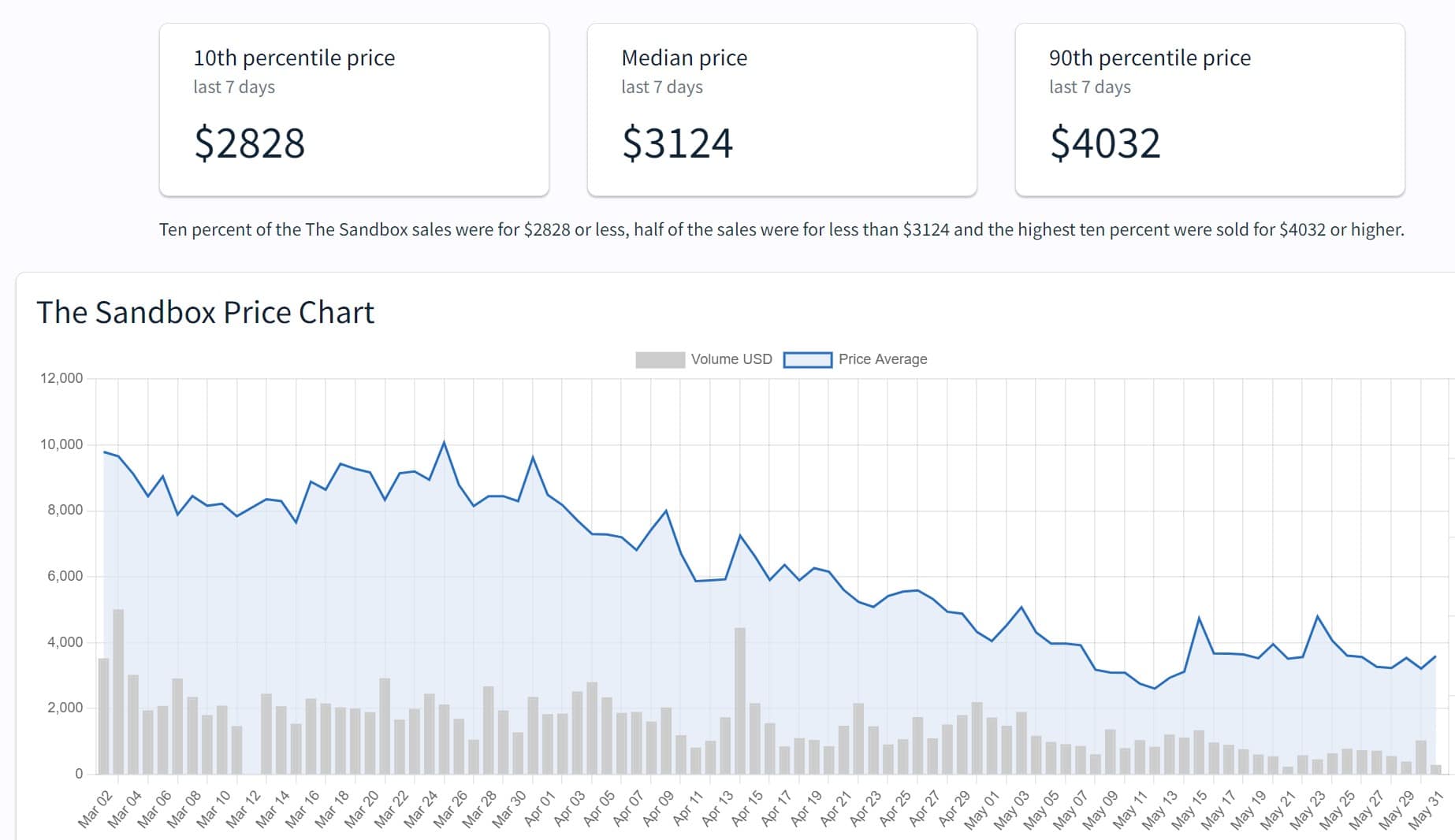 Image via NFT-stats.com
Image via NFT-stats.comThe figures look similar for Decentraland with the average price for a small land plot going for just over $3,000, with some big-ticket estates recently going for $182,000. Not bad considering the initial land offering price was around $20. Being able to turn twenty bucks into six figures is one of the drivers behind metaverse land investing hype for those who are lucky enough to get in early and pick the winners.
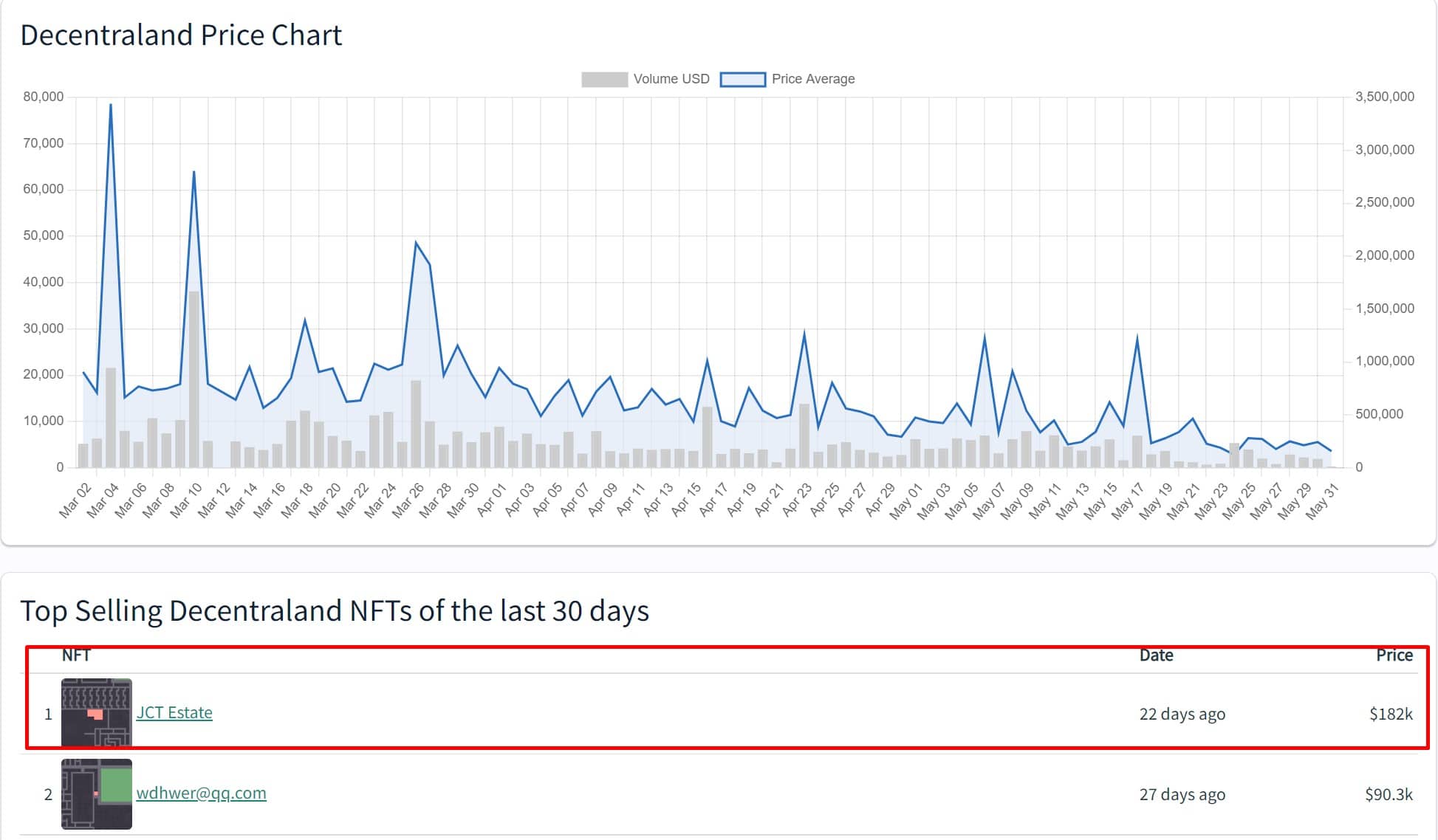 Image via NFT-stats.com
Image via NFT-stats.comWhile the investment may be worth the risk for many, I do think the excitement and hype about the metaverse tends to cloud the logical judgement of many in the space as so many people fomo’d in. There is also the question of whether or not metaverse interest will ever again reach the euphoria stage seen in 2021, as interest in the entire NFT, crypto and metaverse space has waned in 2022.
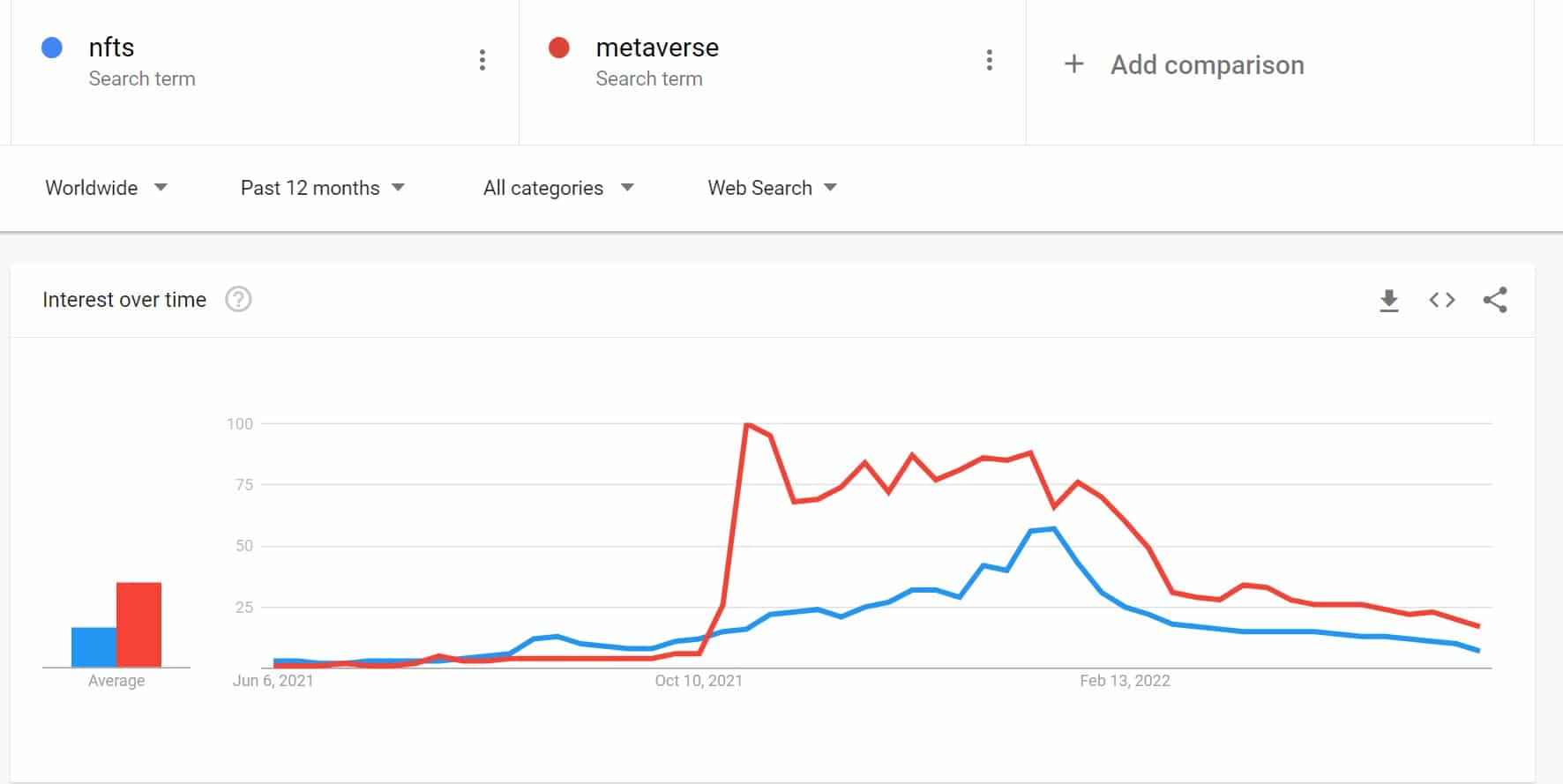 Search Trends for NFTs and Metaverse are on the Decline. Image via Google Trends
Search Trends for NFTs and Metaverse are on the Decline. Image via Google TrendsHow to Invest in Virtual Real Estate
Investing in virtual real estate is much easier than physical real estate and can be done within minutes. All you need to do is:
- Set up a digital wallet like Metamask
- Decide which metaverse platform you want to participate in, DYOR and consider the location, and what participants are already there. You don’t want to buy into a metaverse with a population of one.
- Access an NFT marketplace where land sales are taking place
- Link your wallet to the NFT marketplace, load it up with the currency needed to purchase and hit the buy button.
- Get a quote, a pre-approval, fill out an application, pay the real estate agent, have the property surveyed and appraised, pay the legal fees, transfer the deed and land title, get the bank involved, wait for weeks, if not months for all the paperwork to go through and… oh wait, no, that’s physical property again. Never mind, go back to step four and you’re done!
Then of course, once you have your plot of land you can sit and hodl it or build on it until your heart’s content.

Closing Thoughts
The metaverse is a very exciting concept as it is something new that we cannot quite grasp the full potential or limitless nature of. But like every new technological revolution and evolution, this type of investment carries high risk.
With so much development and building happening in the space as everyone rushes to become part of what could be a multi-trillion-dollar industry, it is almost guaranteed that many projects will not make it, adding another layer of risk to investors. Much like how over 90% of early internet companies have failed, many metaverse and cryptocurrency companies are likely to follow the same fate.
For investors able to stomach the risk and volatility, metaverse and digital land investing offers more opportunities for revenue streams, monetization, and higher ROI potential than what is available with physical real estate.
It can also be done significantly more efficiently than physical real estate investing, with clicks of a button done in minutes, instead of mountains of paperwork, red tape, and intermediates overcomplicating a process that can take weeks or months.
If you are someone whose whole life is spent online, then increasing your virtual presence and investing in metaverse land could be a logical next step. But for many who still want to participate in “real life,” and do things like raise a family, have friends over for Sunday BBQs, and things like that, spending thousands on virtual property, and needing to spend hours online to manage your digital investments may not be the best call, especially if you do not have a physical and stable property secured for your real-life adventure game.
I am a big fan of those post-apocalyptic and zombie-themed TV shows and books, and I do often find myself questioning my asset acquisition in life. As I mentioned earlier, there is something to be said for the security and safety of your physical self. If all hell breaks loose tomorrow and zombies, invading armies, pirates, bandits, or zombie pirate bandits come strolling into town, I am pretty sure that my Bitcoin and NFTs likely aren’t going to get me very far, and one cannot seek refuge in a virtual home, so I often feel that it is a good idea to get your physical life sorted and secure before going “all-in” on speculative fairy tale lands that exist in cyberspace…Always good to have a fallback plan.
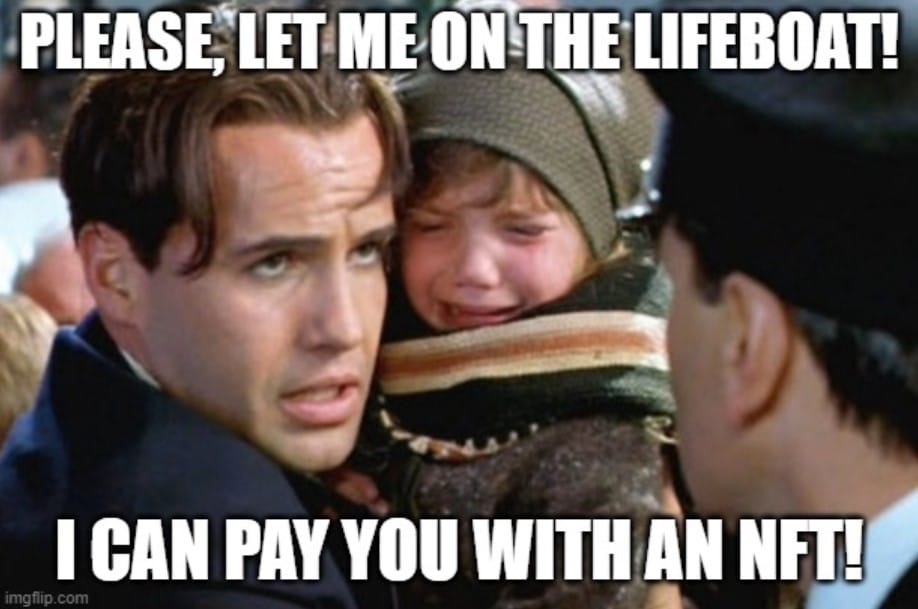 I Doubt He'd Go For It
I Doubt He'd Go For It


